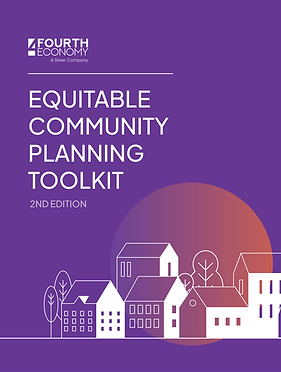Fourth Economy's Commitment to
Advancing Equity
We know that communities and organizations that prioritize equitable opportunities, inclusive decision-making, and diverse perspectives are better positioned to thrive and achieve their goals.
At Fourth Economy, we emphasize the importance of understanding the historical and cultural context of a place to effectively address social, economic, and systemic disparities.
Our commitment to fostering equity and inclusion in our internal operations and project work allows us to:
-
Help the Clients and Communities We Serve
-
Foster a Strong and Diverse Fourth Economy Team
What does Advancing Equity mean to Fourth Economy?
We use Diversity, Equity, Inclusion and Belonging as a framework for evaluating communities in all of our work.
Diversity
We celebrate diverse perspectives, backgrounds, and experiences, recognizing that the varied lived experiences of individuals enrich our approach to community engagement and project outcomes. We strive to reflect the diversity of the communities we serve in our project teams and approaches.
Equity
We work towards creating equal opportunities for all, actively addressing and dismantling systemic barriers that have historically created inequities. Our focus is on ensuring that everyone, particularly those from marginalized groups, can access the resources, opportunities, and support needed to succeed.
Inclusion
Our goal is to create environments where all voices are heard, respected, and valued. Inclusion involves removing barriers to participation and fostering a culture where individuals can contribute fully, without fear of exclusion or marginalization.
Belonging
Beyond inclusion, we aim to create spaces where individuals not only participate but feel truly comfortable doing so. A sense of belonging ensures that people are not just included but are integral members of the process, bringing their whole selves to the table.
Demonstrating Our Commitment
Our experience fostering inclusive development has taken many forms over the years with a few examples noted here:
Project Examples
Thought Leadership
Embedding DEIB Principles in our Work: Core Practices
Equity is vital to truly building thriving communities and organizations. As a consultancy, we empower our clients and their constituents to help correct historical injustices and provide access to opportunities to uplift everyone.
Inequity is caused by systems, and it greatly harms our communities and organizations. As such, Fourth Economy utilizes a comprehensive project approach focused on improving inequitable systems and the ways they interact with each other.
We hold that the process is just as important as the output. There are no equitable outputs without equitable processes.
Project Management
-
Meeting Clients and Their Constituents Needs and Preferences
-
Partnering with Minority, Women, and Disadvantaged Business Enterprises (MWDBEs)
-
Conflict Resolution
Data Analysis
-
Disaggregated Data
-
Limiting Harm in Data Collection and Presentation
Community Engagement
-
Barrier Removal
-
Inclusive Participation
-
Equitable Decision-Making and Strategy Implementation
Our commitment to embedding DEIB principles extends beyond these practices. We continuously evaluate and adapt our methods to better serve the unique needs of each project and community, recognizing that a one-size-fits-all approach does not achieve true equity. By prioritizing Diversity, Equity, Inclusion, and Belonging in every step of our work, we aim to exceed the expectations of our clients and make a meaningful impact in the communities and organizations we serve.

Equitable Community Planning Toolkit
A Playbook for Advancing Equity
Our second edition Equitable Community Planning Toolkit is a free resource developed to help leaders identify priorities, partners, and actions that will lead toward achieving equitable planning goals. It includes information on how communities across the United States are rising to meet the equity imperative, as well as tools to apply promising practices and systems change processes in your community.
The toolkit provides our Equitable Community Planning Framework, which includes four steps to approaching systems change. These steps include analyzing systems and their components, developing interventions, and creating meaningful change. It also provides activities and resources, organized into four workbooks corresponding to each step of the framework, to help you and your community take action.

Embedding DEIB Internally: Core Practices
We work intentionally to embed DEIB to foster a stronger team.
Staff-Led DEIB Initiatives
-
Equity Working Group
-
DEIB Conversations and Training Sessions
-
Employee Resource Groups (ERGs)
Equitable Hiring, Team Development, and Other Operations
-
Reduced Hiring Bias
-
Salary Transparency
-
Collaboration Profiles
-
Professional Development


















